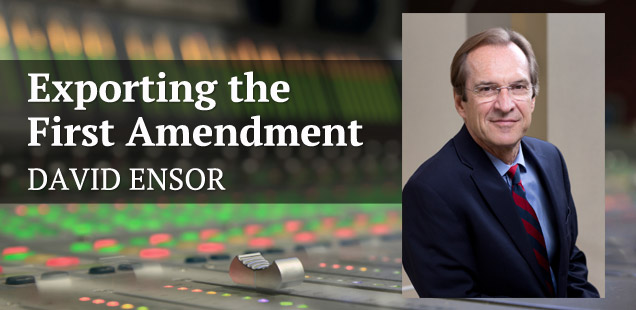
EXPORTING THE FIRST AMENDMENT: STRENGTHENING U.S. SOFT POWER THROUGH JOURNALISM
December 14, 2015, 12:00 pm
A new paper by David Ensor, Joan Shorenstein Fellow (fall 2015) and former director of the Voice of America (VOA), makes the case for protecting and strengthening VOA as an independent journalistic voice in order to increase American soft power.
VOA’s news programming, which is funded by the U.S. government but remains by law editorially independent, reaches almost 188 million people a week in more than 45 languages, through a variety of platforms. Building upon Joseph Nye’s concept of soft power, Ensor argues that VOA is a valuable national security asset, and as such, could do much more for the U.S. if given additional resources. The way forward, Ensor writes, is to continue to build the trust of international audiences by providing honest coverage and partnering with local media – rather than simply advocating for U.S. policies. Ensor compares and contrasts VOA to other state-sponsored media, such as the BBC World Service, CCTV, Al Jazeera and RT (Russia Today), and provides specific recommendations to expand and improve VOA to reach more people in Russia, China, the Middle East and globally.
Read the accompanying article in Foreign Policy, “How Washington Can Win the Information War.”
Listen to Ensor discuss his paper on our Media & Politics Podcast
Introduction
In August 2014, ISIS attacks the town of Shinjar in northern Iraq, sending hundreds of thousands of members of the ancient religious minority known as the Yazidis fleeing up onto Mount Shinjar. Those not already captured are quickly surrounded. Information is scarce, but Voice of America’s Kurdish Service has a Yazidi reporter who soon hears from his people – with what is left of the power in their cell phones.
Hundreds of children are dying on the mountain, they tell him. There is no shelter, no food or water. Many have already been executed. Hundreds of young women are being held, raped and used as sex slaves. VOA’s exclusive details are picked up by regional media, alerting U.S. policymakers.
“I was talking with one of the ladies, for example,” says Iraqi-born journalist Dakhil Elias. “She was captured with fifteen hundred other women and children held prisoner in a school building. She was telling me: ‘Please bomb us! We want to die, not to stay here under ISIS.’” [1] VOA’s Elias is invited to two White House meetings with the president’s deputy national security advisor, where he shares some of the harrowing testimony.
Within days, the U.S. airdrops humanitarian aid on the mountain and then targets airstrikes against ISIS positions around it. The offensive allows Kurdish forces to reach the mountain and lift the siege.
The story of the encircled Yazidis underscores what key policymakers in the White House and State Department know well: the Voice of America (VOA) is a national security asset, and not only because it is a news organization of extraordinary breadth, depth and reach. Many of its best journalists hail from places such as China and Tibet, the Russian Caucasus, northern Nigeria, Venezuela, Iraq or Iran. They are indispensable experts.
Funded by the U.S. government, VOA is by law an editorially independent media organization. With an annual budget of $212 million, VOA has a weekly international audience of almost 188 million people; an increase of 40 percent in the past four years despite budget reductions in real terms each of those years.[2] It reaches them in more than 45 languages through television, radio, Internet and social media – and does so whether their governments like it or not.
